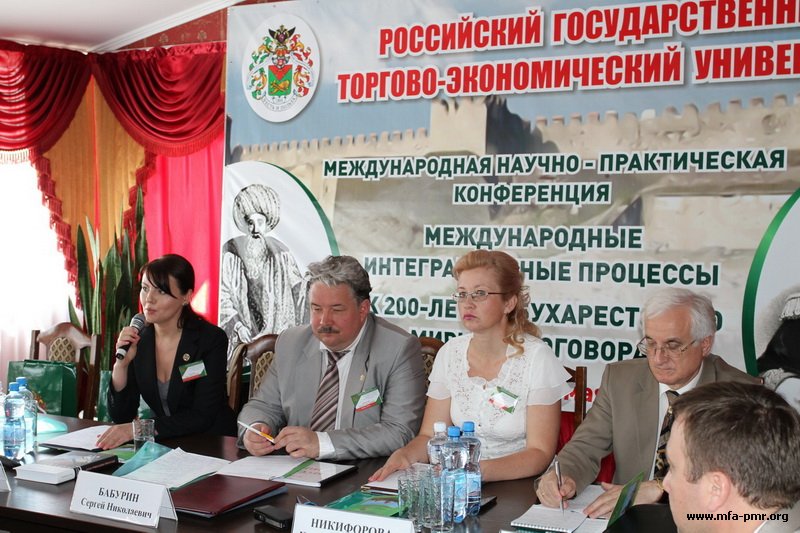On May 21, 2012, Bendery hosted the III International Research and Practical Conference “International Integration Processes” dedicated to the 200 anniversary of Bucharest Peace Treaty. The conference is organized by International Association of Trade-Economic Education (MATEO) and Russian State Trade-Economic University. Participating in the event were head of MATEO Sergey Baburin, Deputy Chairperson of Government of the PMR Natalia Nikiforova, Rector of T.G. Shevchenko Pridnestrovian State University Stepan Beril, representatives of governmental bodies of Pridnestrovie, as well as representatives of scientific community of Russia and Pridnestrovie. The Ministry of Foreign Affairs of the PMR was represented by Head of the foreign office Nina Shtanski, Deputy Foreign Minister Vitaly Ignatiev and officials of the MFA.
Bucharest Peace Treaty was signed on May 16 (28), 1812, by chief representative Mikhail Illarionovich Kutuzov from the Russian side, and for Turkey – by Ahmed Pasha. Treaty between Russian and Ottoman Empires ended the war of 1806-1812. Kutuzov brought about conclusion of the treaty a month before the invasion of Russia by Napoleon. Owing to this, Russian south-western boundaries were secure. It was great military and diplomatic victory which improved strategic environment for Russia by the beginning of Patriotic War of 1812. This treaty had 16 stated and two secret articles and in particular established a new frontier between Russia and Ottoman Empire along the River Prut.
Sergey Baburin stressed that in the days of signing of the Bucharest Peace, the very existence of the Moldovan nation was decided upon. This treaty, according to the politician, was to end the fixing of the civilizational essence of Moldavia, its pro-Russian orientation.
Nina Shtanski told that Bucharest peace is of great significance for the Pridnestrovian history, annexation of Bessarabia to Russia secured Pridnestrovian lands. “At this stage they stopped being borderzone which was additional impetus for their household and economic recovery,” the Minister told. According to the Minister, Russian diplomacy was an example of a talented and skillful foreign policy. “Constructive approach and opportune decision-making neighbored at that time with clear understanding of historic mission of the country in relation to the Balkan peoples,” she stated. Furthermore, the Minister also pointed out peculiarities of the Turkish diplomacy. “Turkish negotiators already at those times intensively applied technology of quasi negotiations, their behavior was a good example of imitation strategy which is used even today by many countries. In this case the goal is not to end a war or achieve peace but rather to stall for time, recollect strength, make profit, including those connected with one's image,” the diplomat marked. She expressed opinion that exploration of two hundred years-old diplomatic experience can be useful, including in the context of studying negotiation process on the Moldova-Pridnestrovie settlement.
In her welcoming address Nina Shtanski highly assessed educational function of the conference. She paid attention to the fact that separate political forces in Romania and Moldova try to use the 200 anniversary of Bucharest Peace Treaty so as to make an attempt and rewrite history, imposing their accusatory view towards Russia. The diplomat expressed confidence that the conference work would contribute to objective and justified assessment of the Russian role in liberation of the region.
In the course of the conference reports highlighting historic context of the Bucharest peace emergence and its consequences for the Balkan peoples were presented. Researches are unanimous in the opinion that Bucharest peace is a fruit of the compromise reached in the conditions of harsh confrontation of four powerful empires: Russian, Ottoman, French and Austrian. For the Napoleon France Danube principalities were a bargaining chip in big diplomatic game with Russia; for Austria – object of imperialistic aspirations; for the Turkish sultan – source of income. But for Russia wars with the Ottoman Empire were not only the question of strengthening security of its state territory. Over the century the Russians shed their blood for the sake of liberation of orthodox peoples of the Balkans. It was not a slogan, it was Russia's geopolitical goal, the principle of historic being of the Russian people.








